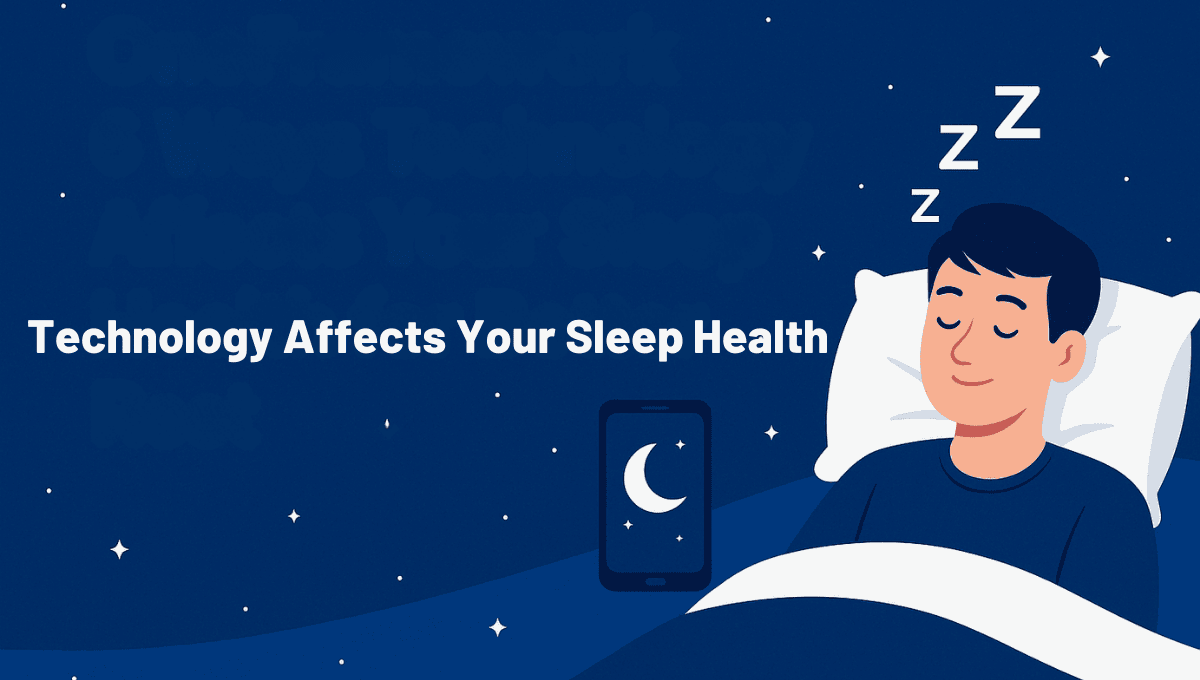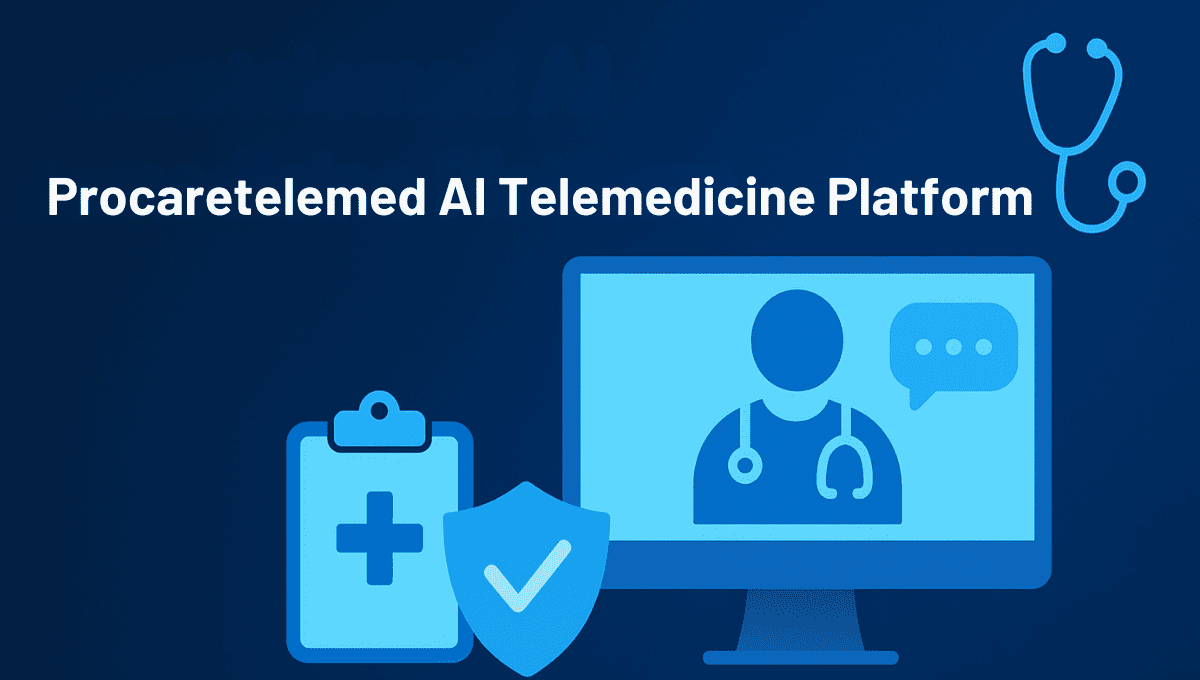In the modern world of hyper-connectedness technology can be an advantage and a drawback. While it keeps us connected and entertained, as well as productive, it may also affect something that our bodies need most: quality sleep. The Oneframework 6 ways technology affects your sleep health provides a detailed guideline to comprehend how technology apps, gadgets, and other technological habits affect our sleep and recovery.The blue-colored light produced from screens, to the continuous stream from notifications alters your sleep patterns and can have long-lasting consequences for your mood, health and productivity. This article delves into the Oneframework 6 ways technology affects your sleep health providing you with practical strategies to manage your digital life, without sacrificing your rest.
1. Blue Light Exposure and Its Impact on Melatonin Production
Blue light emitted by smartphones, tablets laptops and other devices is among the main causes of sleep disruption. According to sleep scientists, exposure to blue light can reduce melatonin, a hormone that regulates the cycle of sleep and wake.
How It Affects You
- Delay Sleep onset You might be unable to fall asleep.
- Lower Sleep Quality The light exposure trick your mind into believing it’s daylight.
- Energy and mood decline Melatonin production issues can cause irritability and fatigue.
Pro Tips: Follow the Oneframework 6 ways technology affects your sleep health suggestion to use the night mode option for your gadgets and restrict screen usage to at minimum 60 minutes prior to bedtime.
2. Constant Notifications and Sleep Fragmentation
Smartphones are made to catch your attention–whether via notifications from social media and email pings or app-based reminders. However, continuous interruptions can result in sleep disruption in which your sleep cycle is continuously interrupted.
Why This Matters
- Light Sleep State Notifications may keep your brain on alert.
- Bad REM Sleep – Interrupted REM sleep phases impact learning, memory, as well as emotional balance.
- Cortisol The spike Alerts at nighttime may cause stress reactions.
Solutions: The Oneframework 6 ways technology affects your sleep health guide suggests turning on Do not disturb mode or putting your phone in a separate bedroom in the evening.
3. Late-Night Work and Mental Overstimulation
Technology lets you work in the bedroom while answering late emails, taking meetings via video, or working on an assignment at midnight. Although this can boost productivity, it also overstimulates your brain and make it difficult to sleep.
Negative Effects
- Trouble falling asleep Your brain stays engaged in “problem-solving mode.”
- Thinking About Racing – A high level of cognitive activity slows relaxation.
- sleep anxiety Stressing about work may further derail the time to rest.
The Action Step Implement the Oneframework 6 ways technology affects your sleep health method. You can set an time for a digital sunset time at which every device at work is shut off at least a couple of hours prior to going to bed.
4. Overuse of Streaming and Gaming Platforms
Watching a series on the big screen or playing online gaming could easily last to the very early hours in morning. The addictive nature of online entertainment may lead to insomnia that causes you to delay sleep even though you are exhausted.
Consequences
- Reduced Sleep Duration This can lead to persistent debt during sleep.
- Unbalanced Sleeping Patterns This can disrupt you circadian rhythm.
- Reduced Alertness in the Daytime impacts concentration and decision-making.
Better habits: As advised in the Oneframework 6 ways technology affects your sleep health setting the timer for gaming or streaming and follow it.
5. Sleep Tracking Apps and Their Paradox
However, the technology created to assist you with sleep may sometimes make it worse. Wearables and apps for tracking sleep could cause orthosomnia which is a condition in which anxiety over getting a good night’s sleep can prevent you from getting a good night’s sleep.
The Problem
- Sleep Pressure – Stressing about sleep data could backfire.
- Unreliable Readings Consumer devices might not yield exact results.
- Obsessive behavior The act of checking sleep statistics first of the day can be a cause for concern.
Recommendation Oneframework 6 ways technology affects your sleep health quality suggests using sleep trackers to provide general guidelines but not as a strict set of scorecards.
6. Social Media and Emotional Stimulation
Social media browsing before the bedtime can expose you to emotional content, whether it’s thrilling and stressful or inciting anger. It stimulates your brain and increases the levels of cortisol and adrenaline which can hinder the body from relaxing.
Emotional Impact
- mood Disruption Social Comparison and negative news can cause stress.
- sleep delays Engaging with stimulating content makes bedtime appear later.
- The Dream Disorder The emotional overload of a person can alter the patterns of dreams.
Digital Detox Tips: The Oneframework 6 ways technology affects your sleep health suggests replacing scrolling late at night with a more relaxing activity like meditation or reading.
Practical Tips to Improve Sleep While Staying Tech-Savvy
While technology can disturb sleep, it also has the potential to improve it if used in a wise manner. Here’s how you can enjoy the benefits of technology without sacrificing the negatives.
Use Blue Light Filters
Allow night shift or blue light reduction on your devices to reduce disruption of melatonin.
Schedule Device-Free Time
Follow the Oneframework 6 ways technology affects your sleep health rule of thumb: avoid screens at least an hour prior to bedtime.
Leverage Calming Tech Tools
Utilize the white noise machine, guided meditations and breathing applications.
Keep Devices Out of the Bedroom
You can charge your smartphone in a different room to keep from the temptations of late night.
Long-Term Benefits of Healthy Tech Habits
When you implement the Oneframework 6 ways technology affects your sleep health recommendations regularly you’ll see positive improvements in your overall health:
- Better Sleep Quality More and deeper restorative cycles of sleep.
- More Focus and productivity Improved cognitive performance.
- Stable mood and emotional Health Reduced anxiety and stress.
- A stronger immune system The body has more energy to fight off illness.
Conclusion
Technology doesn’t necessarily harm sleep. It’s the way and how often we utilize it that makes the difference. If you follow the Oneframework 6 ways technology affects your sleep health it is possible to strike an appropriate balance between keeping your phone connected while getting the sleep your body needs.
When you next go to your phone prior to going to going to bed, be aware that each email, every episode, and each late-night email erodes your quality of sleep. Small adjustments today can result in significant health benefits in the future.
Also Read: Sleeping Well Means More Than Just Hours





